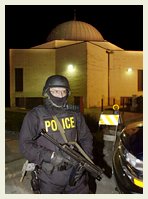
Image: AP/Wide World Photos
The smoke had barely begun to clear from the mass slaughter at the World Trade Center and the Pentagon when the reports began flooding in that Muslims, or those thought to be Muslims, were being harassed and assaulted, scapegoats for angry bigots who lumped them in with the extremists presumed to have carried out the terror attacks. Mosques and Islamic community centers in Chicago, San Francisco, Los Angeles, and Dallas have received bomb threats, had rocks tossed through their windows, and had shots fired at them. But even more ominous than the individual attacks against Arab Americans is the looming threat of an official assault on their civil rights.
Even before Tuesday’s hijackings, civil-rights groups had been collecting a growing number of reports of Arab passengers being singled out by airport security officials for extra questioning and humiliating searches. Such ethnic profiling may well get a boost if the Federal Aviation Administration moves, as many experts insist it should, to boost the use of computer-assisted passenger prescreening systems in airports. Those systems, developed with help from the federal Justice Department, screen travellers’ personal data, looking for criteria that suggest they may be terrorists. Officials won’t say just what criteria are used, but civil rights advocates warn that the potential for discrimination is clear. If, for instance, the system looks for people who travel often to the Middle East, it would effectively flag many Arab Americans.
And that may be only the start. In the name of fighting terrorism, Congress may well abandon proposed legislation to ban racial profiling by police, mull the idea of instituting national ID cards, approve gargantuan budget increases for the FBI, CIA and other federal agencies, and broaden their power to conduct surveillance operations, plant wiretaps, and detain suspects. The main targets of this stepped-up official scrutiny are bound to be Americans of Arab descent.
|
||
The fear that government and police agencies might target ethnic and racial groups has clear and recent precedent. The ghetto riots that rocked hundreds of American cities in the 1960s triggered a major escalation in police power, culminating in the 1968 Omnibus Crime Control and Safe Streets Act which gave law enforcement officials broader authority to conduct surveillance and wiretaps against groups and individuals considered a threat to national security. Black militant groups were specifically singled out for harassment, intimidation and neutralization by the FBI.
The Reagan Administration’s war on drugs in the early 1980s ushered in another big expansion of police power. Many Americans were ready to dump constitutional guarantees of due process and privacy to eradicate the drug scourge — as long as the targets were blacks and Latinos. The consequences of this casual tossing of civil rights came in the form of widespread racial profiling by local police, drug sweeps, illegal searches and seizures, evictions from housing projects, and mass incarceration, all of which disproportionately affected people of color.
With the Iranian fundamentalist revolution in 1979, the escalating conflict between the Israelis and Palestinians, the terror attacks against US military personnel in Lebanon, and the 1990-1991 Gulf War, Muslim Americans came more and more to be viewed with suspicion in the United States. Sensationalized media reports firmly planted the notion in the minds of many Americans that “Arab” and “terrorist” were one and the same. By the 1990s Arab terrorists had replaced the Soviets as the maniacal villains in a spate of Hollywood movies. The World Trade Center bombing in 1993 by Islamic militants only heightened the fear of Arabs.
Since the Gulf War, Arab-American leaders have reported a sharp increase in taunts, harassment and threats to Muslims on the job, in schools and in the streets. They have complained that police agencies have stepped up surveillance of their prayer services and meetings, and that Muslim travelers are routinely being targeted for ID checks, baggage searches, and surveillance at airports.
President Clinton upped the ante in 1995 with his anti-terrorism act, which gave the FBI greater power to infiltrate groups, quash fundraising by foreigners, monitor airline travel, seize hotel records and trash due process by permitting the admission of secret evidence to expel immigrants. Civil rights groups denounced the act as an open license for federal agencies to assail the rights and privacy of any individual or group it deemed a threat. But with public outrage at a fever pitch following the Oklahoma City bombing in 1995, Congress passed the anti-terrorism law the following year. Even though that attack had nothing to do with them, Arab Americans vigorously opposed that bill, fearing that they would become its prime targets. That fear has now intensified after the carnage in New York.
The shameful terror attack on the World Trade Center and the Pentagon was a heartwrenching tragedy for Americans. But the targeting of Arab Americans for the crazed acts of a few would only compound the tragedy.

















